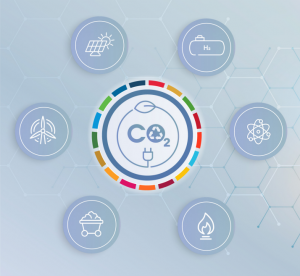
Bold and sustained action must start now and maximize the use of all low- and zero-carbon technologies if we are to achieve carbon neutrality by 2050, warns the Roadmap to carbon neutrality for Europe, North America, and Central Asia released today by UNECE in the lead up to critical climate talks at COP27.
The report, which builds on the input from international experts and data scientists from across Europe, North America, and Central Asia, identifies a range of technology and policy solutions for the region to attain carbon neutrality by 2050 despite the current energy and geopolitical crises. It finds that investment in energy as % of Gross Domestic Product would need to increase from 1.24% in 2020 to 2.05% per year from 2025 until 2050. This values the investment needed at between USD 44.8 and 47.3 trillion by 2050, with any additional delay in taking action adding to the bill. As exemplified by the exponential costs of extreme weather events registered this summer and over the past years, inaction bears a much higher cost on society.
Olga Algayerova, Executive Secretary of UNECE said: “Inaction is a policy choice that will lead to greater, possibly insurmountable, challenges in the future. Only bold, immediate, and sustained action can decarbonize energy in time to avoid a climate disaster. This report is a bleak reminder that increased investment in conventional fossil fuels is delusional when viable low- and zero-carbon technologies exist. Governments must embrace policy frameworks in support of carbon neutrality and create a level-playing field to finance a just transition toward carbon-neutral energy systems”.
At present, over 80% of the primary energy mix in the UNECE region is fossil fuel based. Climate models indicate that current national actions and international climate targets set in the Paris Agreement and COP26 fall short of delivering carbon neutrality and limiting global warming to 1.5 – 2 °C.
To attain carbon neutrality, the report shows that the UNECE region must:
-
Diversify primary and final energy supply with all low- and zero-carbon technologies
-
Accelerate phase-out of unabated fossil fuels
-
Scale-up electrification of all sectors with emphasis on renewable energy and nuclear power. New forms of energy storage (electric, mechanical, thermal, chemical) will need to be developed to decrease the need for fossil energy backups.
-
Build capacity to support widespread innovation of low- and zero-carbon technologies such as carbon capture, use and storage (CCUS), hydrogen and advanced nuclear power
Although approaches vary on a sub-regional level, the report identifies specific policy actions for governments to enact. It calls for increased technology transfer and deployment and institutional capacity to plan and drive ambitious transformation of energy systems. These actions will support buy-in and adoption from all stakeholders to build secure, affordable, and carbon-neutral energy systems.
Countries’ energy decisions should take into account the comparative carbon impact over the entire life cycle of all generation technologies and supporting infrastructure, as highlighted in the recently published life-cycle assessment of electricity sources.
The report recalls that coordinated international cooperation will be essential to attain carbon-neutral energy systems. UNECE provides a much-needed inclusive and neutral platform for developing rules, standards, and norms for systemic lifestyle and infrastructural changes. Supportive policies, incentives, and regulatory frameworks encourage regional and sub-regional technical cooperation across power, industry, buildings, and transport sectors for projects of common interest and public-private partnerships.
Note to editors
This publication, the first UN-regional led modelling of the energy system in 2022, builds on the recommendations from the Pathways to Sustainable Energy Project and the UNECE Carbon Neutrality Project. The project supports countries’ efforts to reach carbon neutrality and attract investments into clean infrastructure projects. The publication forms part of the UNECE Carbon Neutrality Toolkit. Countries are invited to put into practice the UNECE Carbon Neutrality toolkit when developing resilient energy systems.